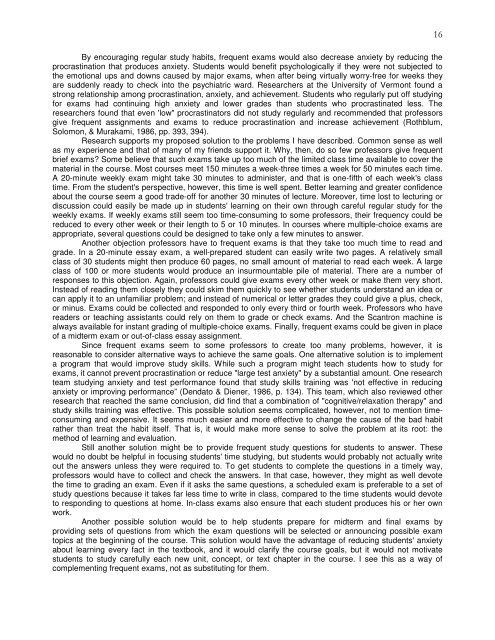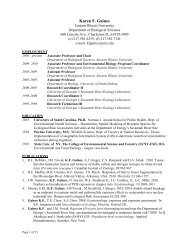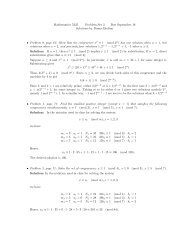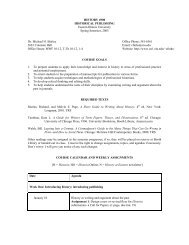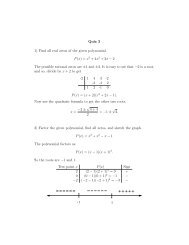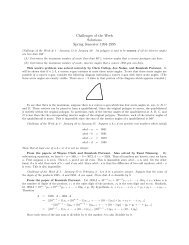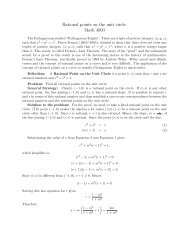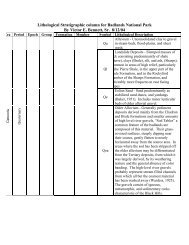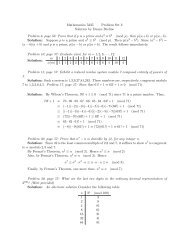Handed My Own Life Annie Dillard - Eastern Illinois University
Handed My Own Life Annie Dillard - Eastern Illinois University
Handed My Own Life Annie Dillard - Eastern Illinois University
Create successful ePaper yourself
Turn your PDF publications into a flip-book with our unique Google optimized e-Paper software.
By encouraging regular study habits, frequent exams would also decrease anxiety by reducing theprocrastination that produces anxiety. Students would benefit psychologically if they were not subjected tothe emotional ups and downs caused by major exams, when after being virtually worry-free for weeks theyare suddenly ready to check into the psychiatric ward. Researchers at the <strong>University</strong> of Vermont found astrong relationship among procrastination, anxiety, and achievement. Students who regularly put off studyingfor exams had continuing high anxiety and lower grades than students who procrastinated less. Theresearchers found that even 'low" procrastinators did not study regularly and recommended that professorsgive frequent assignments and exams to reduce procrastination and increase achievement (Rothblum,Solomon, & Murakami, 1986, pp. 393, 394).Research supports my proposed solution to the problems I have described. Common sense as wellas my experience and that of many of my friends support it. Why, then, do so few professors give frequentbrief exams? Some believe that such exams take up too much of the limited class time available to cover thematerial in the course. Most courses meet 150 minutes a week-three times a week for 50 minutes each time.A 20-minute weekly exam might take 30 minutes to administer, and that is one-fifth of each week's classtime. From the student's perspective, however, this time is well spent. Better learning and greater confidenceabout the course seem a good trade-off for another 30 minutes of lecture. Moreover, time lost to lecturing ordiscussion could easily be made up in students' learning on their own through careful regular study for theweekly exams. If weekly exams still seem too time-consuming to some professors, their frequency could bereduced to every other week or their length to 5 or 10 minutes. In courses where multiple-choice exams areappropriate, several questions could be designed to take only a few minutes to answer.Another objection professors have to frequent exams is that they take too much time to read andgrade. In a 20-minute essay exam, a well-prepared student can easily write two pages. A relatively smallclass of 30 students might then produce 60 pages, no small amount of material to read each week. A largeclass of 100 or more students would produce an insurmountable pile of material. There are a number ofresponses to this objection. Again, professors could give exams every other week or make them very short.Instead of reading them closely they could skim them quickly to see whether students understand an idea orcan apply it to an unfamiliar problem; and instead of numerical or letter grades they could give a plus, check,or minus. Exams could be collected and responded to only every third or fourth week. Professors who havereaders or teaching assistants could rely on them to grade or check exams. And the Scantron machine isalways available for instant grading of multiple-choice exams. Finally, frequent exams could be given in placeof a midterm exam or out-of-class essay assignment.Since frequent exams seem to some professors to create too many problems, however, it isreasonable to consider alternative ways to achieve the same goals. One alternative solution is to implementa program that would improve study skills. While such a program might teach students how to study forexams, it cannot prevent procrastination or reduce "large test anxiety" by a substantial amount. One researchteam studying anxiety and test performance found that study skills training was 'not effective in reducinganxiety or improving performance” (Dendato & Diener, 1986, p. 134). This team, which also reviewed otherresearch that reached the same conclusion, did find that a combination of "cognitive/relaxation therapy" andstudy skills training was effective. This possible solution seems complicated, however, not to mention timeconsumingand expensive. It seems much easier and more effective to change the cause of the bad habitrather than treat the habit itself. That is, it would make more sense to solve the problem at its root: themethod of learning and evaluation.Still another solution might be to provide frequent study questions for students to answer. Thesewould no doubt be helpful in focusing students' time studying, but students would probably not actually writeout the answers unless they were required to. To get students to complete the questions in a timely way,professors would have to collect and check the answers. In that case, however, they might as well devotethe time to grading an exam. Even if it asks the same questions, a scheduled exam is preferable to a set ofstudy questions because it takes far less time to write in class, compared to the time students would devoteto responding to questions at home. In-class exams also ensure that each student produces his or her ownwork.Another possible solution would be to help students prepare for midterm and final exams byproviding sets of questions from which the exam questions will be selected or announcing possible examtopics at the beginning of the course. This solution would have the advantage of reducing students' anxietyabout learning every fact in the textbook, and it would clarify the course goals, but it would not motivatestudents to study carefully each new unit, concept, or text chapter in the course. I see this as a way ofcomplementing frequent exams, not as substituting for them.16


